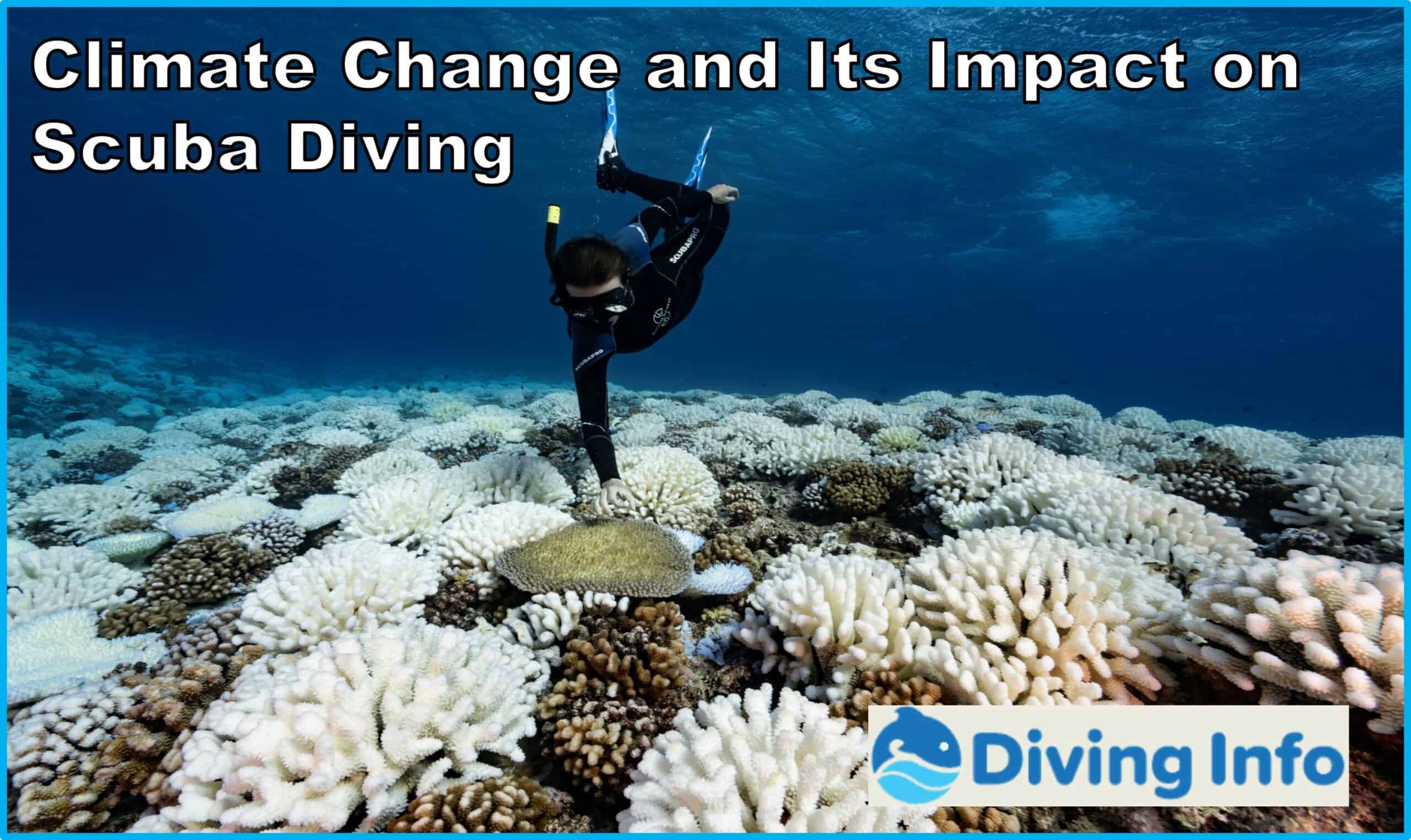*This post may contain affiliate links. As an Amazon Associate we earn from qualifying purchases.
Climate change is a global issue that affects every corner of our planet, from the highest mountain peaks to the deepest ocean depths. It’s a topic that concerns us all, including those who explore the underwater world through scuba diving. The relationship between climate change and scuba diving is a complex one, intertwining the beauty and thrill of diving with the sobering reality of our changing environment.
Climate change affects scuba diving by altering marine ecosystems. Rising ocean temperatures and acidification harm coral reefs, impacting biodiversity. Divers play a crucial role in studying these changes and promoting sustainable practices.
In this article, we’ll delve into the fascinating and sometimes alarming intersection of these two topics. We’ll explore how climate change is altering the marine life we so admire, the role scuba divers play in studying these changes, and how the scuba diving industry is responding to this global challenge. We’ll also discuss what divers can do to help mitigate these effects and ensure the future of their beloved sport.
As we embark on this journey, we invite you to dive in with us. Whether you’re an experienced diver, a concerned environmentalist, or simply curious about the world around you, there’s something here for everyone.
Key Takeaways
| Climate change is impacting marine life, including coral reefs, shellfish, sea turtles, sharks, plankton, whales, seagrass, and mangroves. |
| Divers can make a difference by practicing eco-friendly diving, participating in citizen science projects, advocating for marine conservation, and supporting sustainable dive operators. |
| The scuba diving industry is responding to climate change through sustainable practices, initiatives, and innovations. |
| Changes in popular dive sites due to climate change include coral bleaching, shifts in species distribution, damage from storms, and rising sea levels. |
| The future of scuba diving relies on addressing climate change and taking action to protect our oceans. |
The Impact of Climate Change on Ocean Life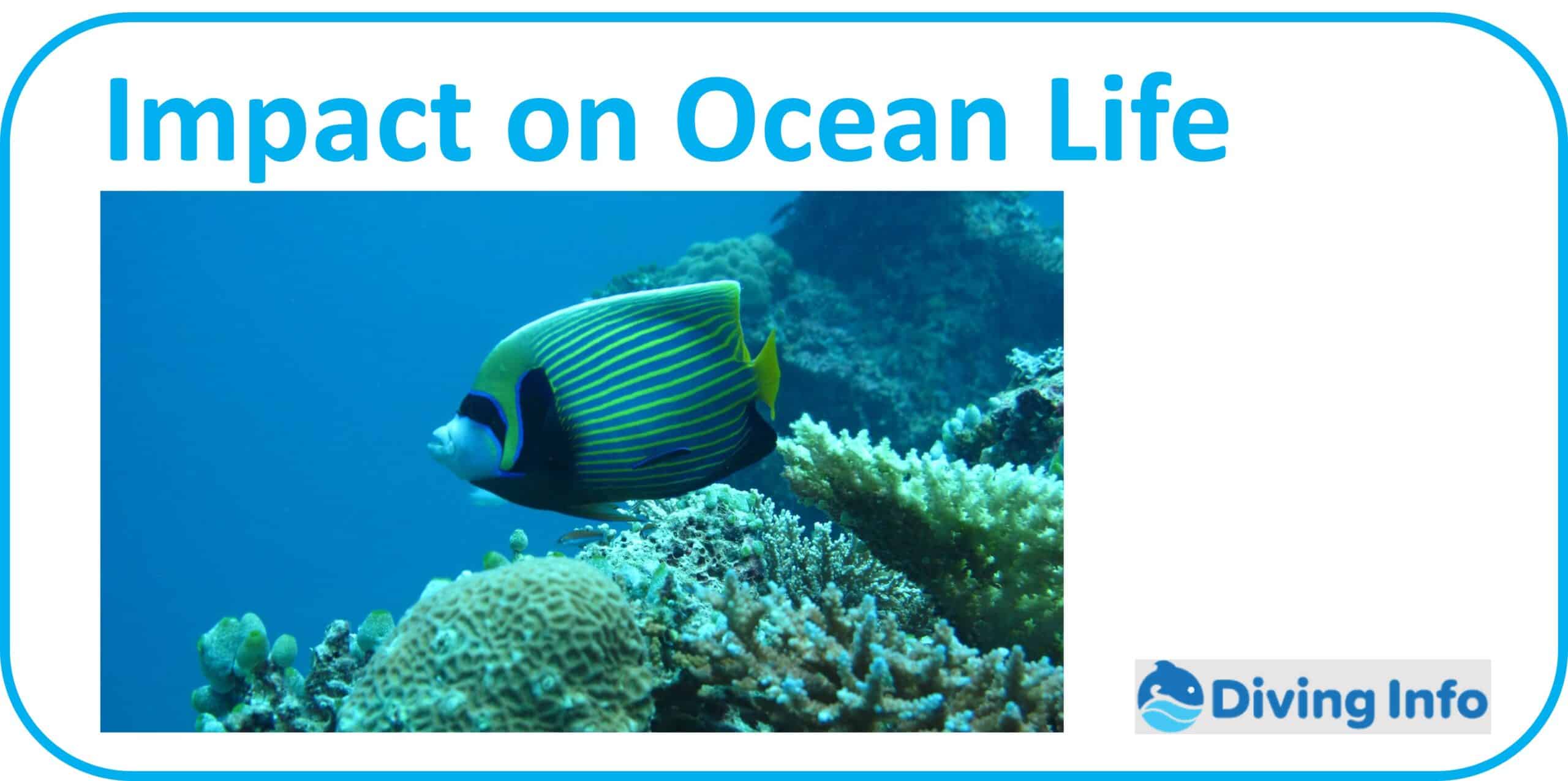
Climate change is not just a land-based issue. It’s a deep-sea problem too, affecting the vast and diverse world beneath the ocean’s surface. This section will delve into the profound effects of climate change on marine biodiversity and the ecosystems that scuba divers love to explore.
Climate Change and Marine Biodiversity
Marine biodiversity refers to the variety of life forms in the ocean, from the tiniest plankton to the largest whales. This biodiversity is under threat due to climate change. Rising temperatures, ocean acidification, and sea-level rise are all consequences of climate change that can disrupt the delicate balance of marine ecosystems.
- Rising Temperatures: Warmer waters can lead to the migration of marine species to cooler areas, disrupting local ecosystems and food chains.
- Ocean Acidification: Increased carbon dioxide (CO2) absorption leads to more acidic oceans, affecting the survival of shell-forming marine life like corals and shellfish.
- Sea-Level Rise: Rising sea levels can lead to the loss of crucial coastal habitats such as mangroves and seagrass beds.
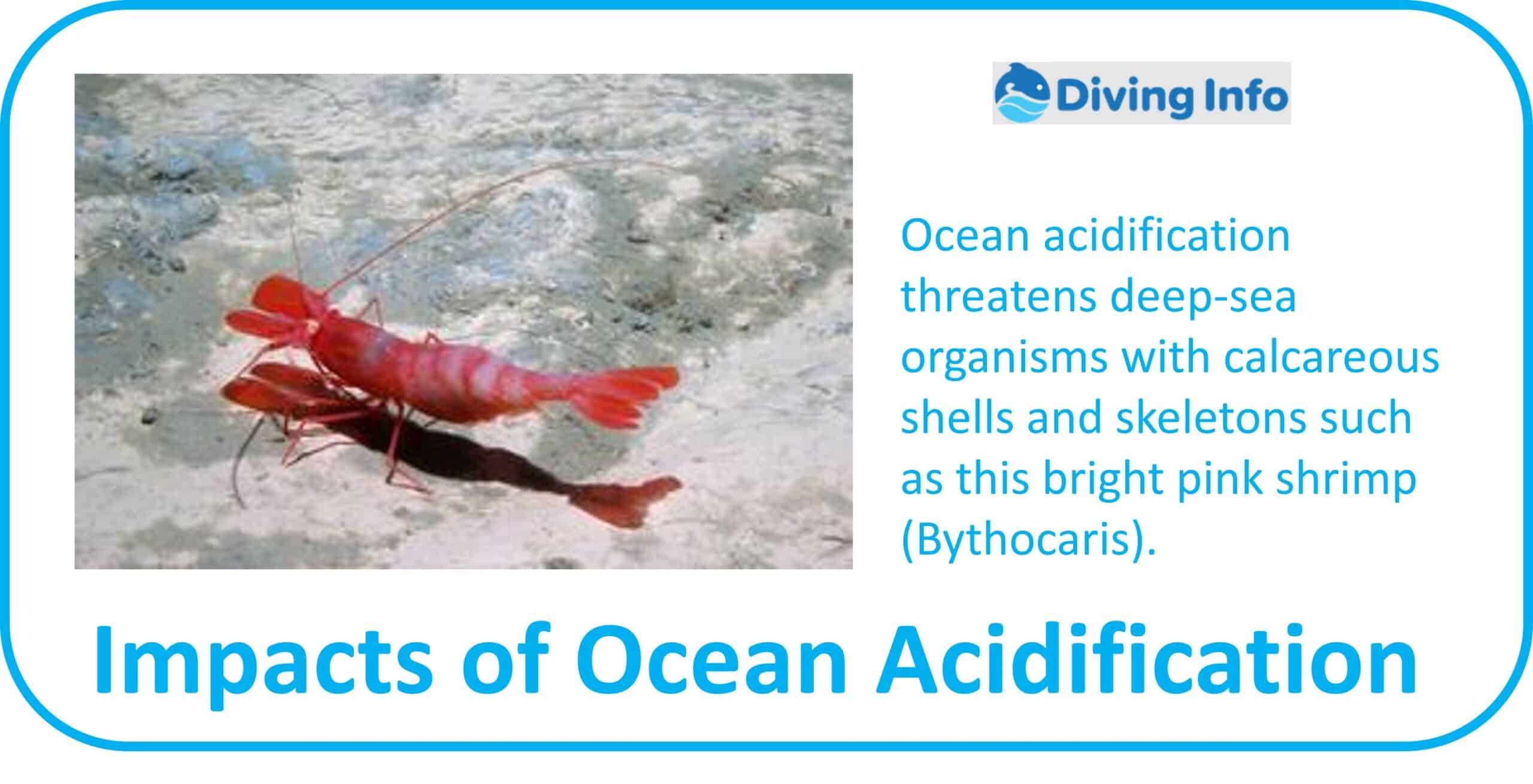
The following table summarizes the damage that rising temperature can cause to marine life.
| Marine Species | Impact of Climate Change |
| Coral | Coral bleaching due to warmer sea temperatures, difficulty building skeletons in more acidic waters |
| Shellfish | Difficulty forming shells in more acidic waters, changes in distribution due to temperature changes |
| Sea Turtles | Rising sea levels affecting nesting sites, temperature-dependent sex determination skewed by warmer sands |
| Sharks | Changes in distribution due to temperature changes, potential declines in prey species |
| Plankton | Changes in distribution and abundance due to temperature changes, base of the food chain so impacts are felt up the chain |
| Whales | Changes in distribution due to temperature changes, potential declines in prey species |
| Seagrass | Damage from more frequent and intense storms, potential benefits from increased carbon dioxide |
| Mangroves | Loss of habitat due to rising sea levels, damage from more frequent and intense storms |
Climate Change and Coral Reefs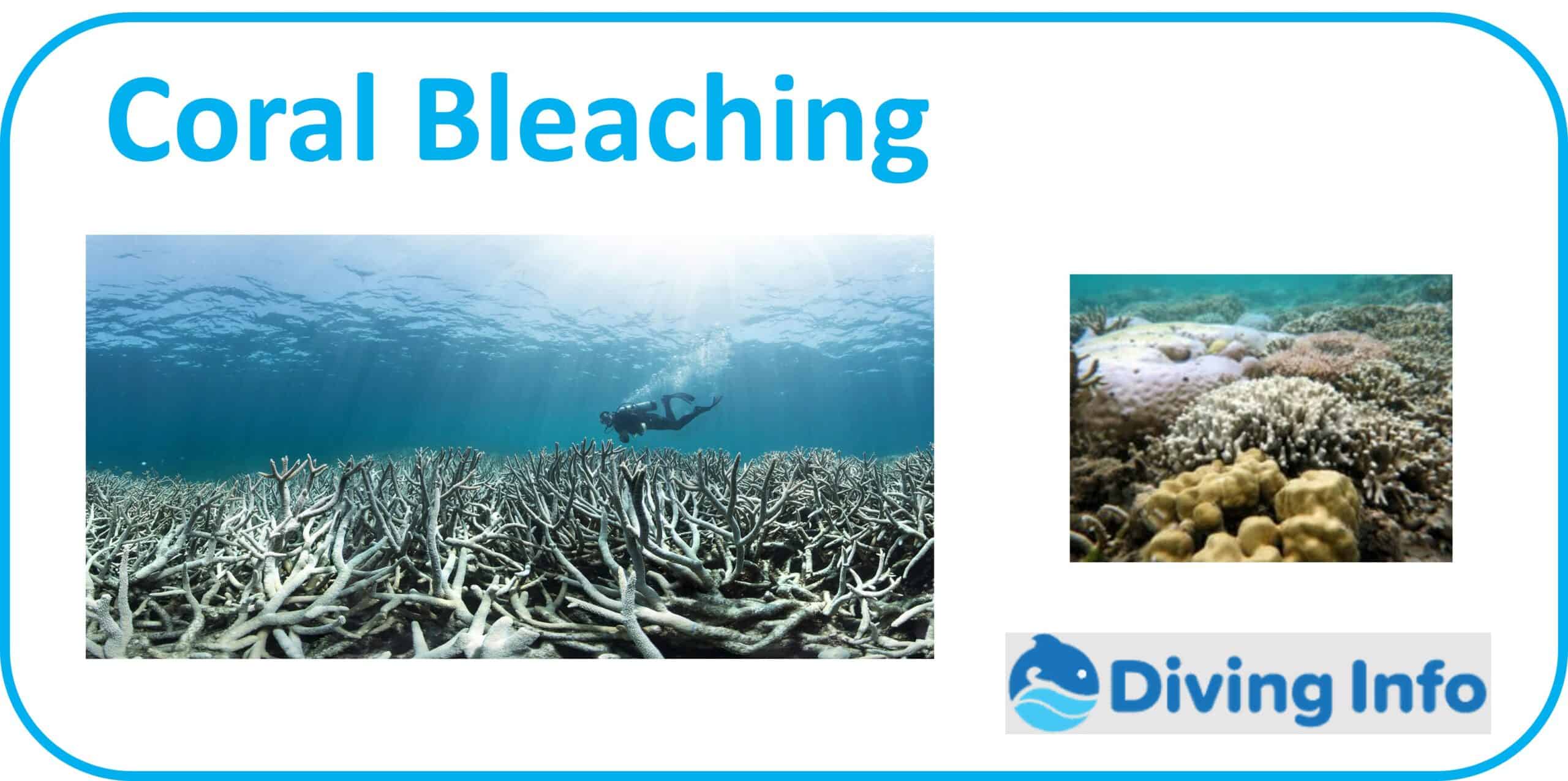
Coral reefs, often referred to as the “rainforests of the sea,” are particularly vulnerable to climate change. These vibrant ecosystems are home to a quarter of all marine species, despite covering less than 1% of the ocean floor. Here’s how climate change is impacting these underwater paradises:
- Coral Bleaching: This occurs when corals, stressed by warm sea temperatures, expel the symbiotic algae living in their tissues, causing them to turn white. Without these algae, corals struggle to grow and reproduce, leading to a decline in reef health.
- Ocean Acidification: As mentioned earlier, more acidic waters make it harder for corals to build their calcium carbonate skeletons, slowing reef growth and making corals more susceptible to damage.
- Storm Frequency and Intensity: Climate change can lead to more frequent and intense storms, causing physical damage to coral reefs.
Specific Examples of Climate Change on Coral Reefs
As we dive deeper into the impacts of climate change, it’s important to understand how it’s affecting some of the world’s most popular dive sites. The table below provides a snapshot of these changes, highlighting the urgent need for action to protect these underwater treasures.
| Dive Site | Impact of Climate Change |
| Great Barrier Reef, Australia | Increased coral bleaching events due to warmer sea temperatures, changes in species distribution |
| Blue Hole, Belize | Coral bleaching and damage from more frequent and intense storms |
| Palau, Micronesia | Rising sea levels affecting coastal ecosystems, changes in species distribution |
| Raja Ampat, Indonesia | Coral bleaching due to warmer sea temperatures, changes in species distribution |
| Galapagos Islands, Ecuador | Changes in species distribution due to temperature changes, potential declines in prey species |
| Red Sea, Egypt/Sudan | Coral bleaching due to warmer sea temperatures, changes in species distribution |
| Maldives | Rising sea levels affecting coastal ecosystems, coral bleaching due to warmer sea temperatures |
| Bonaire, Caribbean | Coral bleaching due to warmer sea temperatures, damage from more frequent and intense storms |
Scuba Divers: Frontline Observers of Climate Change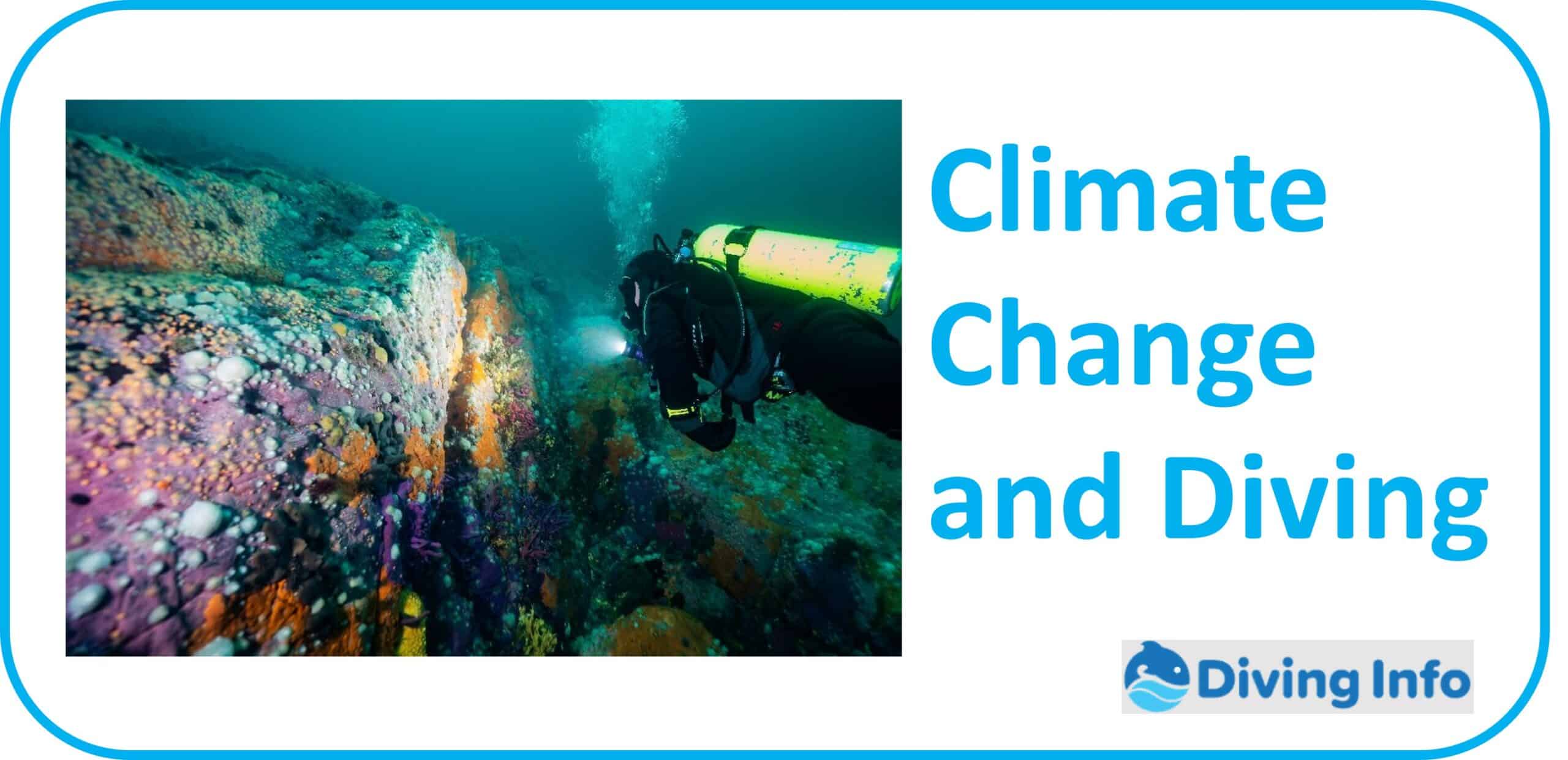
Scuba divers are more than just ocean explorers. They are citizen scientists, playing a crucial role in studying the effects of climate change on marine ecosystems. With their unique underwater perspective, divers can contribute valuable data and insights to climate change research.
Scuba Divers and Citizen Science
Citizen science involves the collection and analysis of data by amateur scientists or enthusiasts. In the context of scuba diving, divers can contribute to climate change research in several ways:
- Species Monitoring: Divers can record the species they encounter during their dives, providing data on biodiversity and species distribution.
- Temperature Logging: Many dive computers record water temperature. This data can be used to monitor changes in sea temperature over time.
- Photographic Evidence: Photos taken by divers can document changes in coral health, invasive species presence, and other ecological changes.
The following table gives an overview of sustainable practices that divers should embrace to reduce their contribution to global warming and to protect our oceans.
| Sustainable Practice | Description |
| Mindful Interaction | Avoid touching or disturbing marine life and coral during dives. |
| Responsible Gear Disposal | Dispose of old diving gear responsibly, consider recycling or donating. |
| Choose Sustainable Operators | Support dive operators who follow sustainable practices and contribute to local conservation efforts. |
| Participate in Cleanups | Join local beach or underwater cleanups to help remove marine debris. |
| Use Eco-Friendly Equipment | Choose diving gear made from recycled or sustainable materials. |
| Educate Others | Share your knowledge about marine conservation and sustainable diving practices with others. |
| Support Conservation Efforts | Donate to or volunteer with organizations that protect marine environments. |
| Minimize Carbon Footprint | Consider the carbon footprint of your diving activities and look for ways to reduce it, such as choosing local dive sites or offsetting the carbon emissions of your travel. |
Scuba Divers in Climate Change Research: Case Studies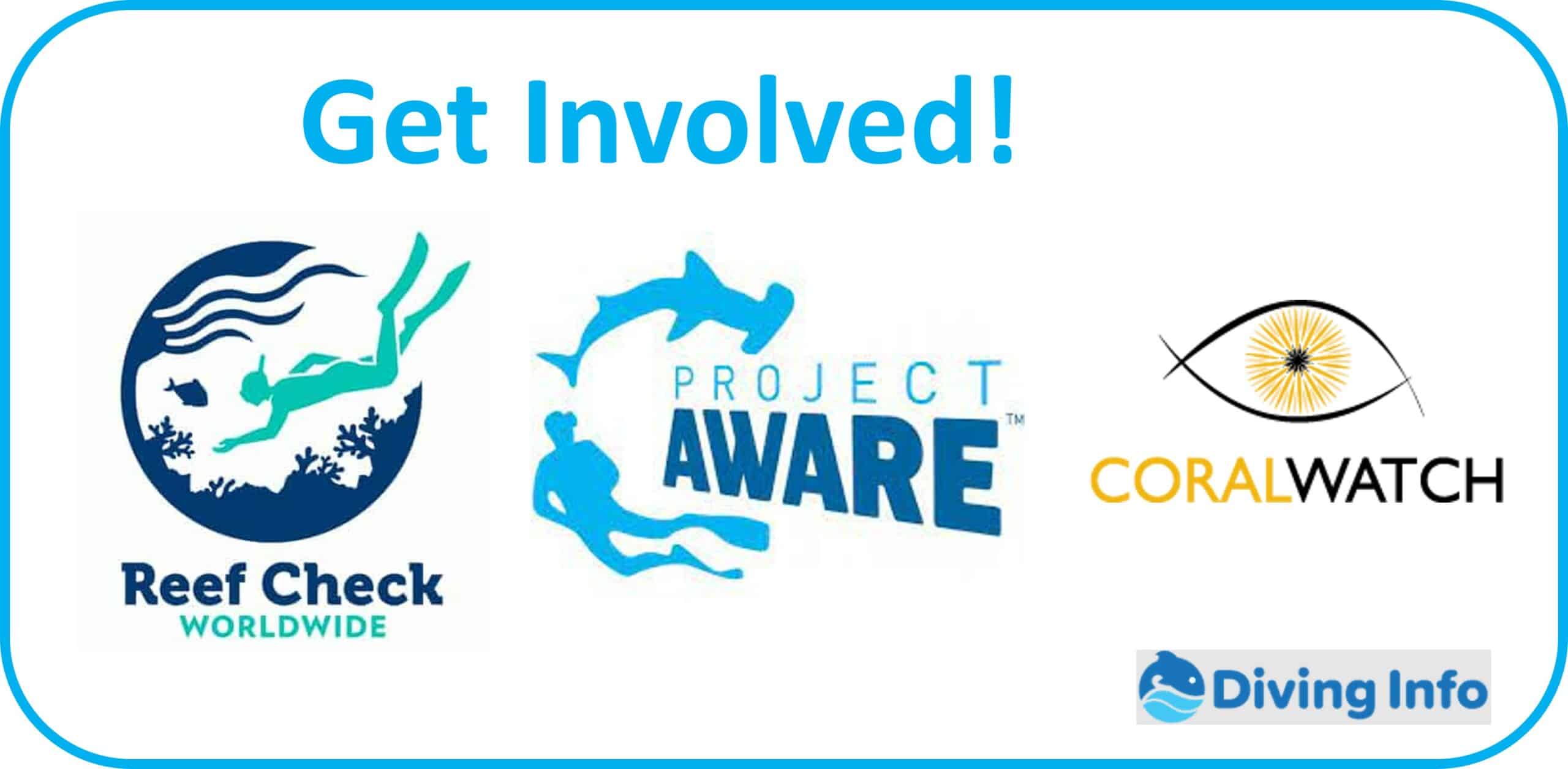
There are numerous examples of scuba divers contributing to climate change research. Here are a few notable cases:
- Reef Check: This international program trains divers to monitor reef health. The data collected by these divers is used by researchers to track changes in reef ecosystems over time. Learn more.
- Project AWARE: This global movement of scuba divers advocates for ocean protection. They organize Dive Against Debris events, where divers collect and report data on marine debris.
- CoralWatch: This citizen science project developed by the University of Queensland allows divers to monitor and report on coral health worldwide.
These case studies highlight the potential for scuba divers to contribute to our understanding of climate change’s impact on our oceans.
Climate Change: A New Challenge for Scuba Diving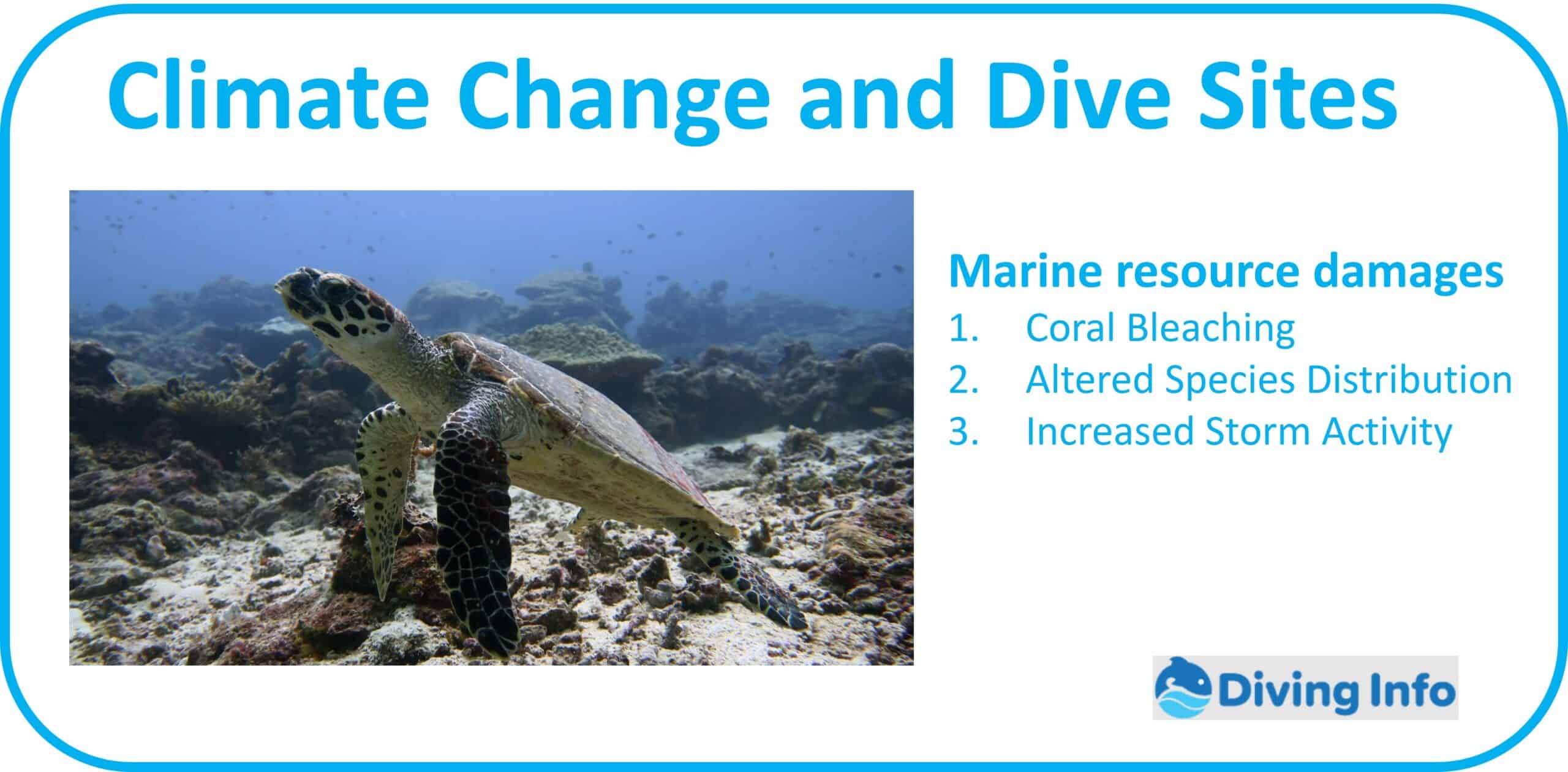
Climate change doesn’t just affect the marine life we admire during our dives; it also directly impacts the scuba diving experience. From altering our favorite dive sites to shaping the future of the sport, climate change is a challenge that the diving community must confront.
Climate Change and Dive Sites
Our beloved dive sites are not immune to the effects of climate change. Here’s how these changes might affect your next dive:
- Coral Bleaching: As mentioned earlier, warmer sea temperatures can lead to coral bleaching, transforming vibrant reefs into ghostly white landscapes.
- Altered Species Distribution: Climate change can cause marine species to migrate, meaning the creatures you’re used to seeing at a particular dive site might no longer be there.
- Increased Storm Activity: More frequent and intense storms can damage dive sites, making them less accessible or safe for divers.
The Future of Scuba Diving in a Changing Climate
Looking ahead, climate change presents both challenges and opportunities for the scuba diving community.
| Challenge | Response |
| Adapting to Change | Divers and dive operators will need to adapt to changes in dive site conditions. This might involve seeking out new dive sites or adjusting dive practices to minimize environmental impact. |
| Education and Advocacy | The diving community can play a crucial role in educating the public about climate change and advocating for marine conservation. |
| Innovation | Climate change could drive innovation in the diving industry, from developing new diving technologies to pioneering sustainable diving practices. |
In the face of these challenges, the scuba diving community’s love for the ocean and commitment to its protection will be more important than ever.
Scuba Diving Industry’s Response to Climate Change
The scuba diving industry is uniquely positioned to witness the effects of climate change on our oceans. But witnessing is not enough. It’s time for action. This section explores how the industry is responding to climate change, from adopting sustainable practices to launching initiatives to combat this global issue.
Sustainable Practices in the Scuba Diving Industry
Sustainability is no longer a choice; it’s a necessity. The scuba diving industry is recognizing this and implementing practices to minimize its environmental impact:
- Eco-Friendly Equipment: Many diving companies are now offering gear made from recycled or sustainable materials. This includes everything from wetsuits to dive masks.
- Green Diving Operations: Dive operators are adopting practices such as reducing fuel consumption, minimizing waste, and using renewable energy sources for their operations.
- Responsible Diving: Divers are being educated on responsible diving practices, such as not touching or disturbing marine life and avoiding damage to coral reefs.
Scuba Diving Companies Taking Action Against Climate Change
Beyond sustainable practices, diving companies are taking a proactive role in combating climate change. Here are a few examples:
- PADI’s Project AWARE: This initiative focuses on two major ocean issues – marine debris and shark and ray conservation. Divers are encouraged to participate in Dive Against Debris surveys and report their findings.
- Green Fins Initiative: This UN-backed program promotes environmentally friendly diving and snorkeling practices. Dive operators who join commit to a set of best practices to reduce their environmental impact.
- Blue Ventures: This social enterprise uses scuba diving for marine research and conservation. Their work includes monitoring marine ecosystems and developing community-led conservation initiatives.
These initiatives show that the scuba diving industry is not just reacting to climate change – it’s actively fighting it. As we move forward, the industry’s role in protecting our oceans will only become more critical.
How Divers Can Make a Difference in Combating Climate Change
As divers, we have a unique connection to the ocean. We see its beauty, its diversity, and unfortunately, the impacts of climate change. But we’re not just observers. We can take action. Here’s how you, as a diver, can contribute to the fight against climate change and help protect our oceans.
Eco-Friendly Diving: Tips for Divers
Every dive is an opportunity to make a difference. Here are some tips for eco-friendly diving:
- Mindful Interaction: Be careful not to touch or disturb marine life, and avoid contact with the coral.
- Responsible Gear Disposal: Dispose of your diving gear responsibly. Consider recycling or donating old gear.
- Choose Sustainable Operators: Support dive operators who follow sustainable practices and contribute to local conservation efforts.
- Participate in Cleanups: Join local beach or underwater cleanups to help remove marine debris.
Contributing to Conservation Efforts
Beyond individual actions, divers can contribute to larger conservation efforts:
- Citizen Science: Participate in citizen science projects, such as Reef Check or Project AWARE’s Dive Against Debris, to collect data on marine health and debris.
- Advocacy: Use your voice to advocate for marine conservation, whether it’s through social media, community outreach, or contacting your local representatives.
- Education: Share your knowledge and experiences with others. Educate your friends, family, and community about the impacts of climate change on our oceans and what they can do to help.
Remember, every action counts. As divers, we have a responsibility to protect the underwater world we love so much.
The Future of Scuba Diving in a Climate-Changing World
As we’ve explored throughout this article, the intersection of climate change and scuba diving is a complex and urgent issue. The future of our beloved underwater world hangs in the balance, and with it, the future of scuba diving.
The Importance of Addressing Climate Change for Scuba Diving
The impacts of climate change on our oceans are undeniable. Coral bleaching, shifting marine species distributions, and more frequent and intense storms are just a few of the challenges we face. These changes not only threaten the marine life we cherish but also the very essence of scuba diving. Addressing climate change is not just about protecting our planet; it’s about preserving the joy, wonder, and adventure of diving.
A Call to Action: Divers and the Diving Industry
We, as divers and members of the diving industry, have a unique role to play in this fight. We are the witnesses, the advocates, and the stewards of the ocean. Here’s what we can do:
- Educate and Advocate: Share your knowledge about climate change and its impacts on the ocean. Advocate for policies and practices that protect our marine environments.
- Practice Sustainable Diving: Follow eco-friendly diving practices and support sustainable dive operators.
- Participate in Conservation Efforts: Join citizen science projects, participate in cleanup events, and contribute to conservation initiatives.
The challenge is great, but so is our love for the ocean. Let’s rise to this challenge and ensure that future generations can experience the wonder of scuba diving in a healthy, thriving ocean. The time to act is now. Let’s dive in, together.

